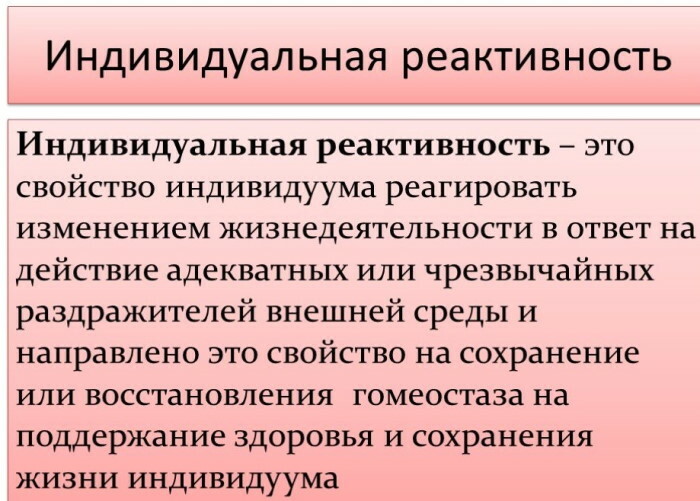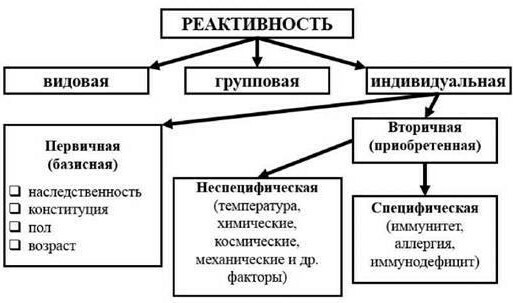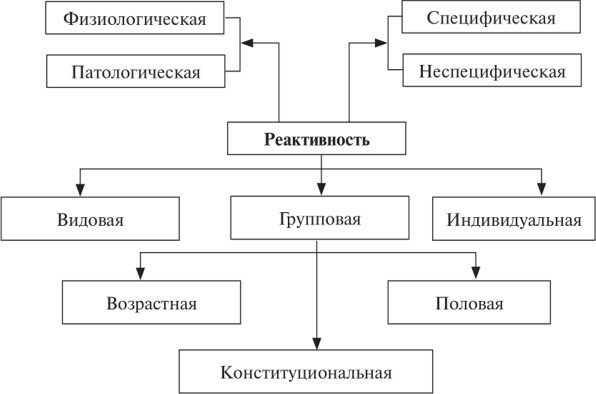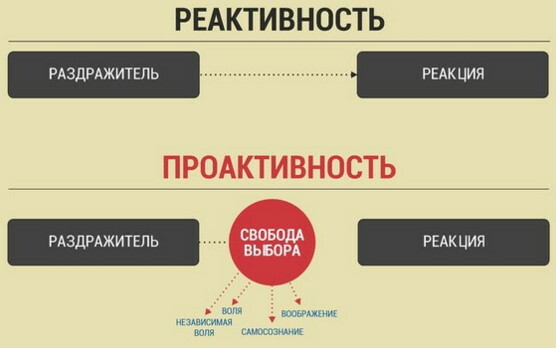Content
- Definition of what it is
- Classification
- Emotional
- Situational
- Field
- Social
- How does it manifest
- Influence
- Video about reactivity in psychology
Reactivity is resistance arising on actions restricting freedom. The goal of this behavior is to restore lost freedom. V.S. Merlin was the first to introduce this term into psychology into science, based on the teachings of ancient philosophers about temperament.
Definition of what it is
Reactivity in psychology is an unpleasant state that occurs in response to lack of freedom. Initially, the concept of temperament was considered by Hippocrates and his student K. Gallen. They talked about the fact that there are some innate character traits and behavior of people that cannot be changed or corrected.
Scientists have developed a theory based on the predominance of fluids in the body:
- sanguine people - blood;
- phlegmatic people - mucus;
- choleric people - yellow bile;
- melancholic - black bile.
These characteristics were considered unchanged until the 20th century, but with the development of science, the description of types of temperament has expanded.
AND. Pavlov supplemented the teaching based on the characteristics of the nervous system:
- Sanguine - a person with loud, emotional speech. Not afraid of change, characterized by a positive mood, not inclined to despondency and sadness.
- Phlegmatic person - calm and balanced type. Does not express feelings and has a stable mood. It is difficult to give in to provocations, it is hard to piss them off.
- Choleric - irascible, unrestrained person. Reacts sharply to stimuli, but leaves easily.
- Melancholic - mental processes in this type are slow. They are passive, reserved people. They are characterized by the depth of feelings.
Despite the descriptions, there are no people who would fully match one of the types. Usually human behavior is based on the predominance of one of them. Further research on temperament has shown that this phenomenon has its own characteristics.

| Property | Description |
| Reactivity | The basis of temperament, determines the response to external stimuli |
| Sensitivity | Sensitivity to the manifestation of external factors |
| Plasticity-rigidity | The ability of the psyche to adapt to changing conditions |
| Introversion-extraversion | Focusing on the inner or outer world |
| Excitability | Emotional response to stimuli |
| Reaction rate | The speed of reaction in response to external influences |
J. W. Brehm in 1981 conducted a study in which he discovered the manifestation of reactivity through showing children accessible and inaccessible objects. As a result, it turned out that children deeply experience that they cannot receive something.
In his work P. Sylvia wrote that when reactivity is shown, it is necessary to provide a message that will create the appearance of the proposed situation as threatening. This way you can reduce the negative effect of the event.
TO. Miller and colleagues in 2006. proposed the concept that reactivity affects adolescent behavior. Smoking and other addictions of this age arise as a response to the prohibitions and prescriptions of adults.
Classification
Reactivity is the response of a person to external or internal stimuli. Distinguish in psychology group, species and individual reactivity. The species property is inherent in animals and does not affect people. The group form of manifestation expresses the general behavior of individuals with similar characteristics.
Individual reactivity is based on the acquired and innate qualities of a particular personality. It is determined by age, gender and type of nervous activity. This form depends on external environmental factors.
Physiological and pathological reactivity is also distinguished. The first is considered a normal response of a healthy person to a stimulus, and the second is a non-specific response to a stimulus.
Emotional
Emotional reactivity is characterized by the strength of manifestation. This property is expressed in a person's ability to experience emotions and feelings. This type is due to both innate qualities and the conditions of upbringing.
Emotional reactivity is manifested in selectivity - to which stimuli an acute reaction occurs. This can happen in both positive and negative ways. A person with a high level of reactivity can be very worried about the failures or rudeness of others, but also experience vivid positive emotions from travel, concerts, festivals.
A low level of reactivity of this type is considered an unfavorable factor. People with these characteristics are more irritable, emotionally unstable, indecisive, and uncommunicative. In adulthood, neurotic manifestations are more common in them.
Situational
Situational reactivity is expressed in the state of the individual at a particular moment, which is characterized by subjective experiences. Such emotional manifestations are tension, anxiety, nervousness in relation to a certain situation. In addition, situational reactivity occurs in response to extreme or stressful conditions.
Field
Field reactivity is manifested in the decision of basic adaptation to external influences. The meaning of the property consists in organizing the pre-tuning of the organism for active interaction with the environment. This form of contact is limited to a certain situation, consumes little energy, but is suitable for solving a small range of problems. The body responds only to the intensity of external stimuli, not their quality.
This type of reactivity is a primitive regulation mechanism, but it provides a person with safety and emotional comfort in the environment. The property differs in that it helps in stabilizing mental balance. Field reactivity is involved in assessing the dynamics of the intensity of external manifestations: movement, changes in relationships in the surrounding space.
Social
Social reactivity refers to the response and behavior that a person exhibits when necessary to solve specific social problems. This property is reflected in the form of a weak awareness of the conditions and goals of the situation, the predominance of external motives, the lack of inclusion of "I" in the process. As a result, a person does not take responsibility or takes it formally, which is reflected in low independence.
The manifestation of reactivity depends on the value of a social task, its acceptance, the involvement of the individual in its solution. The social form manifests itself in impulsiveness or passivity.
How does it manifest
Reactivity in psychology is a person's reaction to actions or rules that restrict freedom. The theory of property is based on the fact that everyone can exercise freedom and act according to it. Expressing free behavior requires the psychological and physical ability to take responsibility for their actions.
Reactivity manifests itself according to the following scheme:
- feeling of freedom;
- restriction of freedom;
- manifestation of resistance;
- restoration of freedom.
Freedom is understood here as an internal sensation of many options for behavior, actions, emotions, relationships. Behavior is considered free if the individual fully manifests it or expects it to be realized in the future. Any situation that interferes with the exercise of freedom is a danger.
Free choice when and how to behave and awareness of the degree of personal freedom affect the appearance of reactivity. A threatening situation is seen as a challenge, a signal for action. The fear of losing independence leads to attempts to regain it through overcoming obstacles and counteracting external stimuli.
Reactivity has several characteristics:
- The property is used in manipulative actions, initially offering options that must be called "undesirable" for the subsequent selection of "desirable".
- Reactivity changes the results of psychological experiments. This is called the Hawthorne effect. It means that when people know about observation, they stop behaving naturally.
- The greater the significance of the event, the stronger and more emotional the reaction.
- Also, if the significance of the situation is imposed from the outside, then the resistance will be stronger.
- Under any circumstances, a person will expect the restoration of freedom.
- Reactivity is used in reverse psychology to interfere with rational decision making.
- The property is characterized as emotional, not rational, as it arises with lightning speed, without thinking.
Sometimes situations arise that show the impossibility of the manifestation of freedom and represent its deprivation. Reactivity as a property of temperament should manifest itself only initially. Upon realizing the hopelessness of the situation, the feeling of resistance subsides.
Some threatening events cause only minor difficulties, while others completely make it impossible to exercise independence. Reactivity has the effect of restoring freedom in danger. But such attempts are weakened by opposing forces.
As the pressure to obey increases, resistance and motivation will increase through giving up one's own will. There will also be events where there is an opportunity to regain freedom, but the costs of implementing efforts are too high to weaken opposition. Both of these forces reduce or make impossible the very attempts to restore independence.
In everyday life, reactivity is used in marketing. For example, sales are always relevant, as the offered goods seem to be more needed in conditions of scarcity. A similar principle works in the upbringing of children. When parents say that a child is too young to try a product, the toddler lights up trying to get it.
In the literature, the reactivity effect is well described by the story of Tom Sawyer, who convinced his friends that they really wanted to paint the fence instead of going to the river. Also the property is shown in the play "Romeo and Juliet". The prohibition on communication, social restrictions make the partner more desirable, as they act through a threat to the freedom of the main characters of the work.
Influence
Reactivity in psychology is a property of temperament that turns on when the will is limited or threatened to restrict it. Life is arranged in such a way that the activities of people are always conditioned by social, cultural, ethical norms. If a person is accustomed from childhood to the manifestation of free will, then reactivity will turn on with every possible threat.
The person is not aware of the actions of reactivity. When a person begins to understand his actions when exposed to stimuli that limit freedom, there is a feeling of being able to control his own behavior. That is, a person takes control over those events in which he wants to participate and give up what he does not want to do.
The higher the level of reactivity, the more the individual tries to regain freedom that has been threatened or has been lost. If actions are threatened by the pressure of society, the property is expressed in the form of resistance to these manifestations.
If it is impossible to regain freedom of desire and activity, reactivity will continue to try every convenient moment. After the restoration of free action, social consequences may be revealed if the situation occurred due to a social threat.
Individuals with a high level of reactivity make life decisions momentarily, under the influence of emotions, which leads to incorrect responses and misunderstandings of the situation. But at a critical moment, the property helps to quickly adapt to the prevailing conditions.
People with low reactivity tend to think over their actions, make decisions for a long time, and even when exposed to external stimuli, they can react slowly. The more circumstances put pressure on such a person, the stronger, albeit longer, the emotional response. Highly excitable people with high reactivity always give an intense response, which characterizes them as uncontrollable and unpredictable.
Reactivity is a mental effect that occurs when a person feels a threat to freedom. This property in psychology is successfully used in marketing and psychology of influence to manage people. Reactivity affects the response of a person in a critical situation, which can be lightning fast or slow depending on the level of the property.
Video about reactivity in psychology
Reactive resistance in cognitive psychology:



